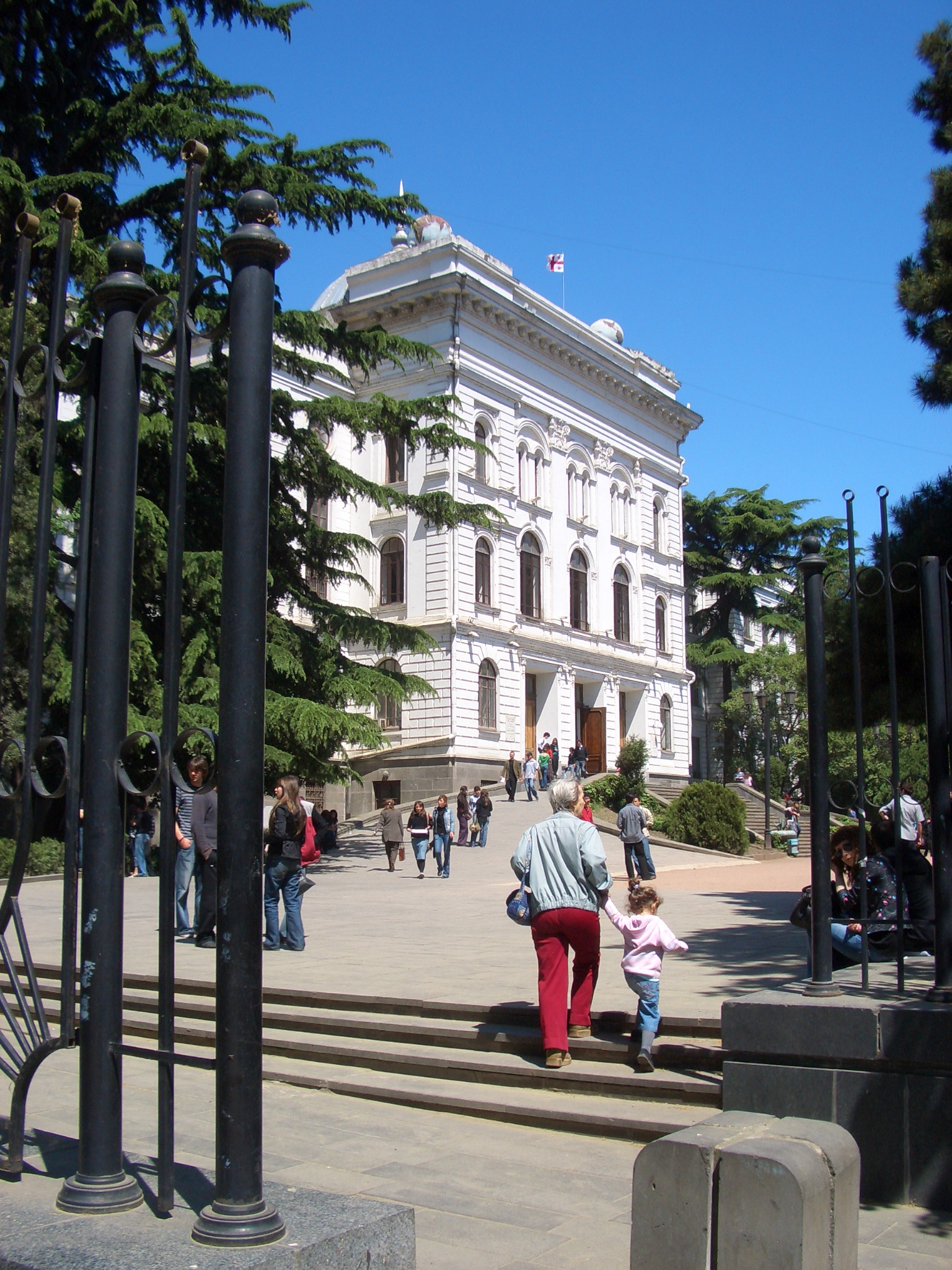|
Aleksandre Pirtskhalaishvili
Aleksandre Pirtskhalaishvili ( ka, ალექსანდრე ფირცხალაიშვილი) (1888 – 23 March 1965) was a Georgian, Soviet historian, Doctor of Philosophy (1942), and professor (1945). In 1915, he graduated from Kiev University, on Historical Faculty of Philology. In 1912 Pirtskhalaishvili went to Germany, and attended courses at Heidelberg University. After returning to Georgia he worked in pedagogy. In 1929 he was invited by the Tbilisi State University, where he lectured until his last days. He was exploring the history of 19th-century Georgia and Russian-Georgian relations.U. Sidamonidze Georgian Soviet Encyclopedia The ''Georgian Soviet Encyclopedia'' ( ka, ქართული საბჭოთა ენციკლოპედია, tr, ქსე) is the first universal encyclopedia in the Georgian language, printed in Tbilisi from 1965, the editor ... p. 332. 1986 Tbilisi References {{DEFAULTSORT:Pirtskhalaishvili, Alexande ... [...More Info...] [...Related Items...] OR: [Wikipedia] [Google] [Baidu] |
Georgia (country)
Georgia is a country in the Caucasus region on the coast of the Black Sea. It is located at the intersection of Eastern Europe and West Asia, and is today generally regarded as part of Europe. It is bordered to the north and northeast by Russia, to the south by Turkey and Armenia, and to the southeast by Azerbaijan. Georgia covers an area of . It has a Demographics of Georgia (country), population of 3.7 million, of which over a third live in the capital and List of cities and towns in Georgia (country), largest city, Tbilisi. Ethnic Georgians, who are native to the region, constitute a majority of the country's population and are its titular nation. Georgia has been inhabited since prehistory, hosting the world's earliest known sites of winemaking, gold mining, and textiles. The Classical antiquity, classical era saw the emergence of several kingdoms, such as Colchis and Kingdom of Iberia, Iberia, that formed the nucleus of the modern Georgian state. In the early fourth centu ... [...More Info...] [...Related Items...] OR: [Wikipedia] [Google] [Baidu] |
USSR
The Union of Soviet Socialist Republics. (USSR), commonly known as the Soviet Union, was a List of former transcontinental countries#Since 1700, transcontinental country that spanned much of Eurasia from 1922 until Dissolution of the Soviet Union, it dissolved in 1991. During its existence, it was the list of countries and dependencies by area, largest country by area, extending across Time in Russia, eleven time zones and sharing Geography of the Soviet Union#Borders and neighbors, borders with twelve countries, and the List of countries and dependencies by population, third-most populous country. An overall successor to the Russian Empire, it was nominally organized as a federal union of Republics of the Soviet Union, national republics, the largest and most populous of which was the Russian SFSR. In practice, Government of the Soviet Union, its government and Economy of the Soviet Union, economy were Soviet-type economic planning, highly centralized. As a one-party state go ... [...More Info...] [...Related Items...] OR: [Wikipedia] [Google] [Baidu] |
Kiev University
The Taras Shevchenko National University of Kyiv (; also known as Kyiv University, Shevchenko University, or KNU) is a public university in Kyiv, Ukraine. The university is the third-oldest university in Ukraine after the University of Lviv and the University of Kharkiv. Its structure consists of 15 faculties and five institutes. The university was founded in 1834 by Nicholas I of Russia as the Saint Vladimir Imperial University of Kiev; it has since changed its name several times. During the Soviet Union era, Kiev State University was one of the top three universities in the USSR, along with Moscow State University and Leningrad State University. It is ranked as the best university in Ukraine in many rankings. Its alumni include Mykola Lysenko, Nikolay Bunge, Mykhailo Drahomanov, Mykhailo Hrushevskyi, Nikolai Berdyaev, Mikhail Bulgakov, Ivan Schmalhausen, Theodosius Dobzhansky, Viacheslav Chornovil, and Leonid Kravchuk. The university is named after Taras Shevchenko, who ... [...More Info...] [...Related Items...] OR: [Wikipedia] [Google] [Baidu] |
Heidelberg University
Heidelberg University, officially the Ruprecht Karl University of Heidelberg (; ), is a public research university in Heidelberg, Baden-Württemberg, Germany. Founded in 1386 on instruction of Pope Urban VI, Heidelberg is Germany's oldest university and one of the world's oldest surviving universities; it was the third university established in the Holy Roman Empire after Prague (1347) and Vienna (1365). Since 1899, it has been a coeducational institution. Heidelberg is one of the most prestigious universities in Germany. It is a German Excellence University, part of the U15, as well as a founding member of the League of European Research Universities and the Coimbra Group. The university consists of twelve faculties and offers degree programmes at undergraduate, graduate and postdoctoral levels in some 100 disciplines. The language of instruction is usually German, while a considerable number of graduate degrees are offered in English as well as some in French. 57 Nobel ... [...More Info...] [...Related Items...] OR: [Wikipedia] [Google] [Baidu] |
Tbilisi State University
Ivane Javakhishvili Tbilisi State University ( ka, ივანე ჯავახიშვილის სახელობის თბილისის სახელმწიფო უნივერსიტეტი, tr; often shortened to its historical name, Tbilisi State University or TSU) is a public research university established on 8 February 1918 in Tbilisi, Georgia. Excluding academies and theological seminaries, which have intermittently functioned in Georgia for centuries, TSU is the oldest university in Georgia and the Caucasus region. The total enrollment is over 23,500 students, and there are 5,000 faculty and staff members (collaborators) overall. The main founder of the university was a Georgian historian and academician, Ivane Javakhishvili. Among the co-founders were also several scientists, including Giorgi Akhvlediani, Shalva Nutsubidze, Dimitri Uznadze, Grigol Tsereteli, Akaki Shanidze, Andrea Razmadze, Korneli Kekelidze, Ioseb Kipshidze, P ... [...More Info...] [...Related Items...] OR: [Wikipedia] [Google] [Baidu] |
Georgian Soviet Encyclopedia
The ''Georgian Soviet Encyclopedia'' ( ka, ქართული საბჭოთა ენციკლოპედია, tr, ქსე) is the first universal encyclopedia in the Georgian language, printed in Tbilisi from 1965, the editor in chief of which was Irakli Abashidze. The encyclopedia consists of 11 alphabetic volumes and a 12th exclusively dedicated to the Georgian SSR, printed in both Georgian and Russian. Sources * R. Metreveli, ''Georgian Soviet Encyclopedia'', X, p. 483, Tbilisi, 1986 See also * ''Great Soviet Encyclopedia The ''Great Soviet Encyclopedia'' (GSE; , ''BSE'') is one of the largest Russian-language encyclopedias, published in the Soviet Union from 1926 to 1990. After 2002, the encyclopedia's data was partially included into the later ''Great Russian Enc ...'' Soviet encyclopedias Georgian Soviet Socialist Republic Georgian-language encyclopedias 20th-century encyclopedias {{Encyclopedia-stub ... [...More Info...] [...Related Items...] OR: [Wikipedia] [Google] [Baidu] |
1888 Births
Events January * January 3 – The great telescope (with an objective lens of diameter) at Lick Observatory in California is first used. * January 12 – The Schoolhouse Blizzard hits Dakota Territory and the states of Montana, Minnesota, Nebraska, Kansas and Texas, leaving 235 dead, many of them children on their way home from school. * January 13 – The National Geographic Society is founded in Washington, D.C. * January 19 – The Battle of the Grapevine Creek, the last major conflict of the Hatfield–McCoy feud in the Southeastern United States. * January 21 – The Amateur Athletic Union is founded by William Buckingham Curtis in the United States. * January 26 – The Lawn Tennis Association is founded in England. February * February 27 – In West Orange, New Jersey, Thomas Edison meets with Eadweard Muybridge, who proposes a scheme for sound film. March * March 8 – The Agriculture College of Utah (later Utah State University) i ... [...More Info...] [...Related Items...] OR: [Wikipedia] [Google] [Baidu] |
1965 Deaths
Events January–February * January 14 – The First Minister of Northern Ireland and the Taoiseach of the Republic of Ireland meet for the first time in 43 years. * January 20 ** Lyndon B. Johnson is Second inauguration of Lyndon B. Johnson, sworn in for a full term as President of the United States. ** Indonesian President Sukarno announces the withdrawal of the Indonesian government from the United Nations. * January 29 – Tampere Ice Stadium, Hakametsä, the first ice rink of Finland, is inaugurated in Tampere. * January 30 – The Death and state funeral of Winston Churchill, state funeral of Sir Winston Churchill takes place in London with the largest assembly of dignitaries in the world until the 2005 funeral of Pope John Paul II. * February 4 – Trofim Lysenko is removed from his post as director of the Institute of Genetics at the Russian Academy of Sciences, Academy of Sciences in the Soviet Union. Lysenkoism, Lysenkoist theories are now tr ... [...More Info...] [...Related Items...] OR: [Wikipedia] [Google] [Baidu] |
Soviet Historians
This list of Russian historians includes historians, as well as archaeologists, paleographers, genealogists and other representatives of auxiliary historical disciplines from the Russian Federation, the Soviet Union, the Russian Empire and other predecessor states of Russia. Alphabetical list __NOTOC__ A * Valery Alekseyev (1929–1991), anthropologist, proposed ''Homo rudolfensis'' * Mikhail Artamonov (1898–1972), historian and archaeologist, founder of modern Khazar studies, excavated a great number of Scythian and Khazar kurgans and settlements, including the fortress of Sarkel * Artemiy Artsikhovsky (1902–1978), archaeologist, discoverer of birch bark documents in Novgorod B * Vasily Bartold (1869–1930), turkologist, the "Gibbon of Turkestan", an archaeologist of Samarcand * Konstantin Bestuzhev-Ryumin (1829–1897), 19th-century historian and paleographer, founder of the Bestuzhev Courses for women * Nikita Bichurin (1777–1853), a founder of Sinology, ... [...More Info...] [...Related Items...] OR: [Wikipedia] [Google] [Baidu] |
Academic Staff Of Tbilisi State University
An academy (Attic Greek: Ἀκαδήμεια; Koine Greek Ἀκαδημία) is an institution of tertiary education. The name traces back to Plato's school of philosophy, founded approximately 386 BC at Akademia, a sanctuary of Athena, the goddess of wisdom and skill, north of Athens, Greece. The Royal Spanish Academy defines academy as scientific, literary or artistic society established with public authority and as a teaching establishment, public or private, of a professional, artistic, technical or simply practical nature. Etymology The word comes from the ''Academy'' in ancient Greece, which derives from the Athenian hero, ''Akademos''. Outside the city walls of Athens, the gymnasium was made famous by Plato as a center of learning. The sacred space, dedicated to the goddess of wisdom, Athena, had formerly been an olive grove, hence the expression "the groves of Academe". In these gardens, the philosopher Plato conversed with followers. Plato developed his sessions ... [...More Info...] [...Related Items...] OR: [Wikipedia] [Google] [Baidu] |






